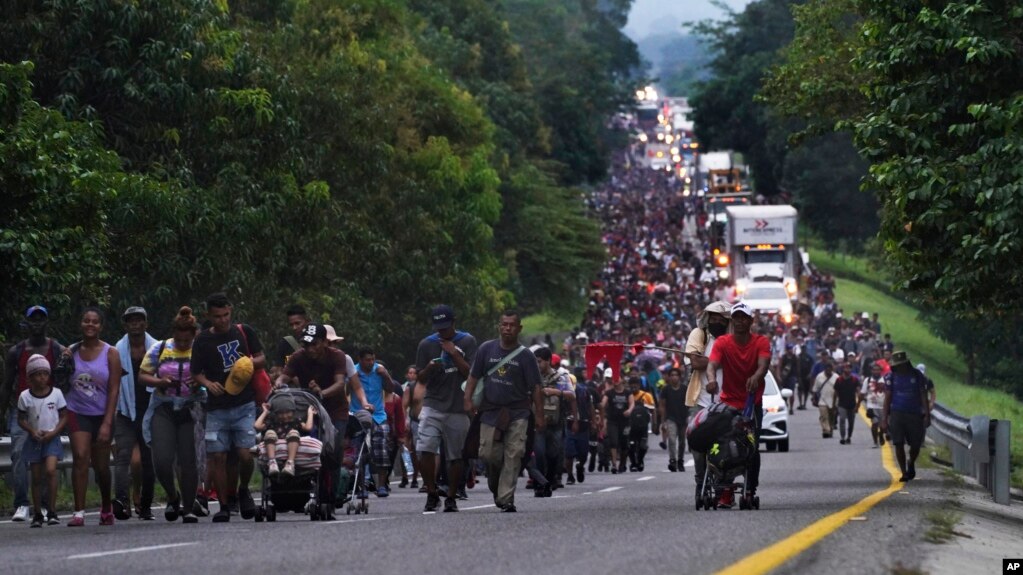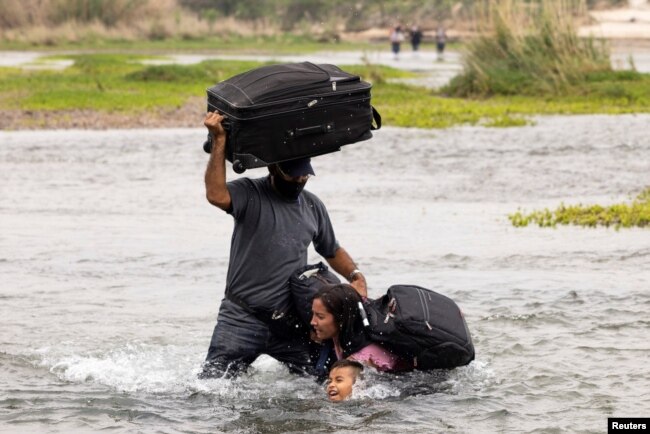Would-Be Immigrants See Hope in Reopened US Border

Maria fled the violent drug gangs of Michoacan with just three changes of clothes, and traveled 2,500 kilometers (1,500 miles) to the edge of Mexico where she now waits to claim political asylum in the United States.
The 38-year-old is part of a record wave of Central and Southern Americans trying to escape violence and poverty at home and make a new life in the world's richest country over the last year, even as its borders have been shut because of the COVID-19 pandemic.
Now they have opened again, Maria sees a chink of light.
"Now I have hope," she told AFP in a makeshift camp in Tijuana, where hundreds have gathered waiting to travel a few miles north across the frontier.
"We came to get away from organized crime. Not because we are criminals," says Maria, whose real name is being withheld at her request.
Her eldest son was recruited by a brutal gang last year. That was when the threats began.
This year she, her husband, two young children and other family members gathered their meager possessions and headed north, in the hope of getting over the border somehow.
Migration advocates say if they can just make it onto U.S. soil, they can tell a border guard they want asylum and will be dealt with in-country.
But with the border closed to all but U.S. nationals, legal residents and certain exempt individuals, getting across was not possible and she had to stake her asylum claim from Mexico. That was six months ago.
While she waits, she lives in the grubby and crowded El Chaparral camp, where dozens of families eek out an existence in flimsy tents.
'I would cross by river'
When the border swung open again this week, fellow resident Perez was also flooded with hope.
"I was very happy," she said. Life in a camp with no electricity is not easy, she adds, though she is hopeful her request for asylum will be granted.
"But if they deny me political asylum, my thought is to cross illegally. I would even cross by river if needs be."
In the 12 months to September, the United States recorded 1.7 million people entering illegally at the southwest border, the highest figure since records began in 1960.
Those illegal crossings are high, says University of San Diego School of Political Science Director David Shirk, because there is no legitimate route.
"By restricting... crossing for asylum purposes, what U.S. border policies have done is to create a very, very large and desperate population of people waiting on the Mexican side," he said.
Many are "trying to wait their turn, but finding that the length of time is too long."

'If we wait... we get killed'
For Margarita, waiting was never an option.
She and her husband Luis and their two children fled their native Bogota after being threatened by members of the FARC, Colombia's main armed rebel group.
Like other people AFP spoke to for this piece, the couple declined to give their real names.
Margarita says she ruled out legal routes for migration because they would just take too long.
"I said 'if I wait to do it in 2022 or 2023, they kill us'."
They packed four suitcases and left for Mexico. In Tijuana, they followed directions until they reached a river that marks the border, which they waded into.
As the water rose to their chests, they lost almost everything.
"All we had left were our papers, our bible and two changes of clothes," says Margarita, showing their belongings in two nylon sacks.
U.S. authorities took them to a detention center and separated them for three days.
The couple and their five-year-old son were transferred to a migrant shelter operated by Catholic charities in San Diego to await a court hearing, while their 19-year-old daughter remained in the detention center.
As Margarita was speaking to an AFP team, her daughter phoned and the two spoke for the first time in ten days.
"Forgive me, forgive me," she sobbed as she gazed at the video of her daughter on the screen.
For David Shirk, the post-COVID economic boom in the United States is likely to attract more immigrants in search of work, making fixing the migration system a priority.
He sees little material difference between policies pursued under President Joe Biden and those of his predecessor Donald Trump.
While Biden has not talked about Trump's border "wall", he is nevertheless at pains not to appear soft.
"It's a kind of nuclear arms race, of... trying to show who's tougher on border controls," he says.
"That's not good for U.S. immigration policy. It actually is not good for the United States and the U.S. economy, it's something that we absolutely need to fix, but for which there is no obvious immediate solution in sight."